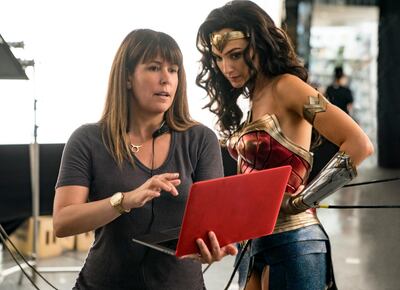After a year of lacklustre ticket sales, it may be up to a group of superheroes and a certain British secret service agent to help global box offices out of last year's slump. However, experts are predicting a slow recovery.
According to Reuters, box office receipts plummeted by 80 per cent in 2020, compared with revenue in the previous year. This plunge was expected, however, given the number of delayed releases and cinema closures brought on by the coronavirus pandemic.

A few production companies decided to avoid theatrical releases altogether, such as Disney, which opted to release its long-awaited live-action adaptation of Mulan on to its streaming service, Disney+, in some parts of the world.
But as cinemas gradually began to reopen, hopes were initially placed on Christopher Nolan's time-warping action film Tenet and Patty Jenkins's superhero sequel Wonder Woman 1984 to help boost box office numbers.
However, social distancing measures, as well as a reluctant cinema audience, dealt a critical blow to the expectations of theatre operators and production companies.

With Tenet, Warner Bros was staunchly obscure for a long time about how the film was faring in cinemas. It was initially expected to fetch more than $500 million at the box office.
British newspaper The Observer reported that the film needed to earn at least $450m to break even. However, it only made $350m.
"This is not how Warner Bros expected it to go even in their worst-case scenario," Jeff Bock, senior box-office analyst for entertainment research and data company Exhibitor Relations, told entertainment news website Vulture in September, a month after Tenet was released worldwide.
“They are not happy with these numbers. I’ve never seen a studio hide anything unless they’re disappointed. If you have something to crow about, they’ll let the world know.”
Wonder Woman 1984 did not fare much better. Though the film made the highest box office opening during the pandemic – earning about $16m in North America when it was released in cinemas over Christmas – its overall financial performance has been a bit of a disappointment. It cost $200m to make, and raked in $118.5m globally; a bitter result considering its 2017 predecessor lassoed in more than $822m.
However, in the US, the film was simultaneously released in cinemas and on the HBO Max streaming service, which no doubt affected its box office performance.
It cost $200m to make, and raked in $118.5m globally; a bitter result considering its 2017 predecessor lassoed in more than $822m.
There is reason to be optimistic, though, especially in light of coronavirus vaccines.
Cinema operators and production companies are now counting on some of this year's most anticipated films – most of which were originally scheduled for release last year – to help box office numbers recover. The pressure is squarely on the shoulders of a handful of blockbusters, including the new James Bond film No Time to Die, slated for an April release, and the Marvel superhero flick Black Widow, scheduled to be released in May.
"I think we'll see a lot of improvements throughout 2021, but I do think it will take some time to get there," Shawn Robbins, chief analyst at BoxOfficePro.com, told Reuters. "It won't be an overnight return to normal by any means."
Other big-budget releases that cinema operators and production companies are pinning their hopes on include the new Fast and Furious instalment, scheduled for a May release; family-friendly animation Minions: The Rise of Gru, slated for a June release; and Top Gun: Maverick and Marvel's Shang-Chi and the Legend of the Ten Rings, due to be released in July.
That's not to say release dates are set in stone. Distribution companies are wary about when to release blockbuster films, keeping a watchful eye on the pandemic and the administering of the vaccine.
They are also likely to continue releasing films in cinemas and streaming services simultaneously. Warner Bros is planning a dual-release for a further 17 films this year, including Dune, parts of which were filmed in Abu Dhabi.
A number of cinema operators in the US, however, are saying that the takings from Wonder Woman 1984's Christmas weekend opening demonstrates that there is still an appetite for the cinema experience.
"We're seeing week after week our attendance go up," Bobbie Bagby Ford, executive vice president of B&B Theatres, told Reuters. She also does not expect the industry to go back to the way things were until vaccination programmes expand and social distancing restrictions can be lifted.
“It’s probably going to be the holidays of 2021 before I see us back to full swing."




